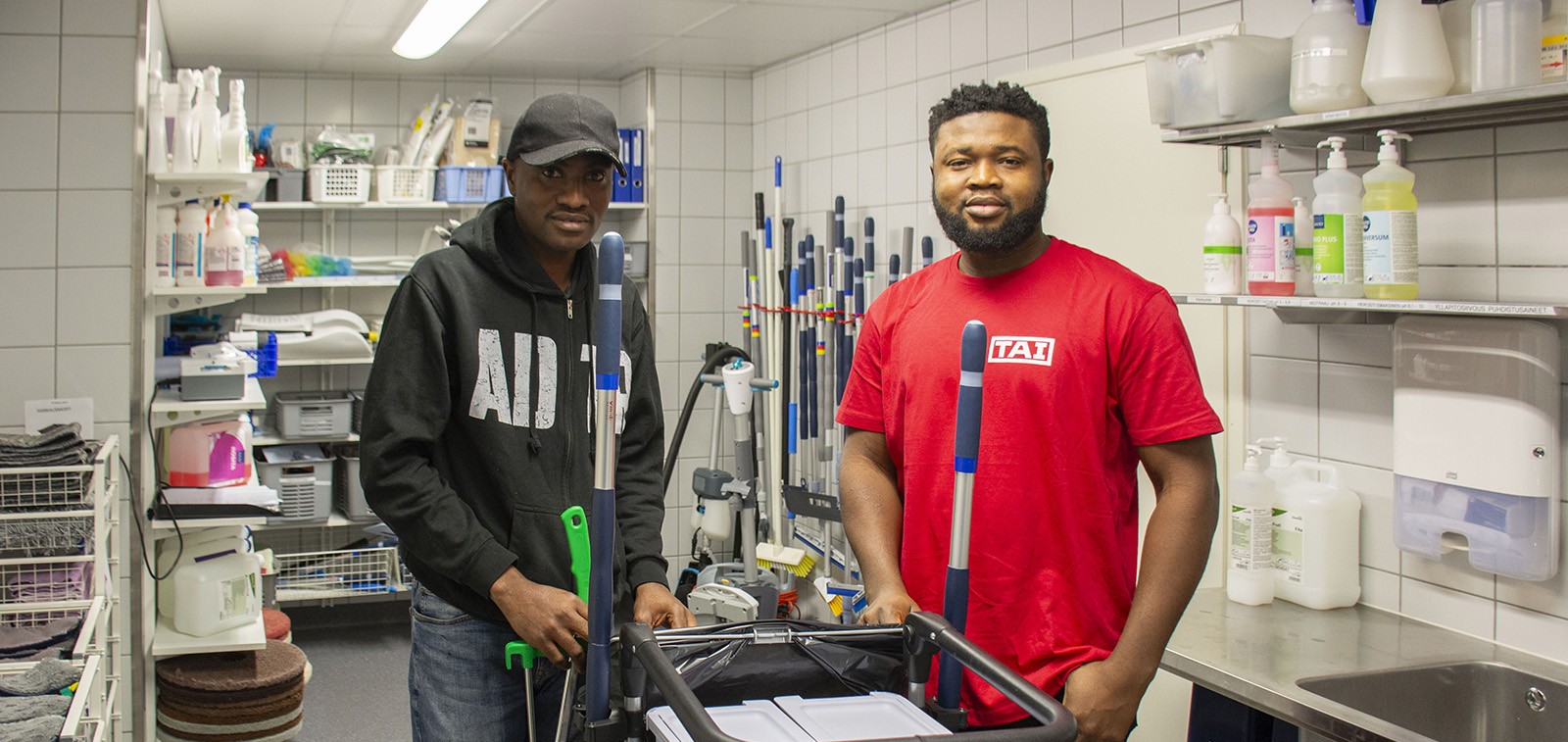- There is a shortage of labour in the cleaning sector. There are many people who are interested in cleaning work, even though they may not yet know Finnish. This was the starting point for the training, says Marjo Kunnia, teacher of cleaning services.
With English degrees, Turku Vocational Institute strives to respond to the training needs of non-Finnish-speaking students, as well as to secure a sufficient number of experts for employers and companies in the region.
In September 2023, 17 students began the cleaning services training in English. They have progressed in their studies as planned.
Familiarisation with Finnish working life
Emmanuel Eze, 30, and Chinedu Emmanuel Okeke, 38, from Nigeria, have recently concluded their first on-the-job learning period, during which they got to familiarise themselves with the cleaning sector in real working life.
- I have previous experience in the accommodation sector in my home country. After arriving in Finland, I got my first job in a cleaning company and wanted to learn more about how the cleaning sector works here in Finland. Although the goal of the work is the same in both countries, there are differences in the cultures, says Eze, who has been in Finland for less than a year.
According to Eze, English-language education enables those arriving in Finland to study and work, as well as helps them integrate into society.
Okeke, who arrived in Finland four months ago, agrees with Eze. Okeke says that education helps them understand how Finnish society works. After hearing about the degree in English, Okeke applied to study, went to the interview, and was selected.
- The training has been useful, and the teachers have been excellent. They have helped with things that have seemed difficult. We have learned a lot about cleaning here, while striving to understand how the Finnish system and working life function.
Finnish skills also important
Both Okeke and Eze emphasise the importance of being able to communicate when integrating into a new country.
- In addition to getting acquainted with the working life in Finland, one must also know Finnish. That is why, in addition to vocational training, we must improve our language skills, Okeke says.
Both believe that, by the end of their studies, they will be able to communicate in Finnish, a language that they only heard for the first time when they arrived in the country. The training includes Finnish language studies, and the language is also learned in interaction with teachers and colleagues. Marjo Kunnia points out that it may be difficult to find employment in the Turku region, without any Finnish skills.
- The training also includes career guidance. As we looked at job advertisements together, we noticed that there are not many vocational requirements, but Finnish skills are required.
Many people in the cleaning services sector work at sites where non-English-speaking customers are also present.
Basic vocational qualification studies can be started without work experience
- Basic vocational qualification studies can be started even with no work experience in the field. The study programme practises both theory and practice from the start. A personal study plan is also drawn up for each student, and studies will progress according to the plan, says Kunnia.
The vocational content of the studies is exactly the same as in the Finnish education. In addition to vocational content, the qualification also includes common unit subjects, such as English, mathematics and sustainable development.
- The teaching of these also takes place in English. Students can provide their competence demonstrations in English, in real working environment. The demonstrations are assessed by the teacher and a representative of the workplace, says Kunnia.
- All optional units are also available in the English-language education. They are determined by the type of on-the-job learning places or jobs students receive, Kunnia specifies.
Motivated employees available
Previously, Kunnia has worked in Helsinki at the Taitotalo vocational adult education centre, which has had English-language training in the cleaning services sector for a couple of years.
- I have also produced my own study materials, because there has not been much available. A new English-language basic work about the cleaning sector, by Puhtausala ry, was completed in December. There are plenty of videos available online, and manufacturers of cleaning machines and cleaning equipment have long drawn up work instructions that can be utilised in teaching.
It is important for students to be able to learn at a real workplace. According to Kunnia, it has been somewhat challenging to find on-the-job learning sites with an English-speaking workplace instructor, in the Turku region.
- We have a group of motivated students who are ready to work in the Turku region, Kunnia says, encouraging the employers.
The duration of basic vocational qualification is approximately two years. If a student gets a job in the sector earlier, they can continue their training as apprenticeship training.

